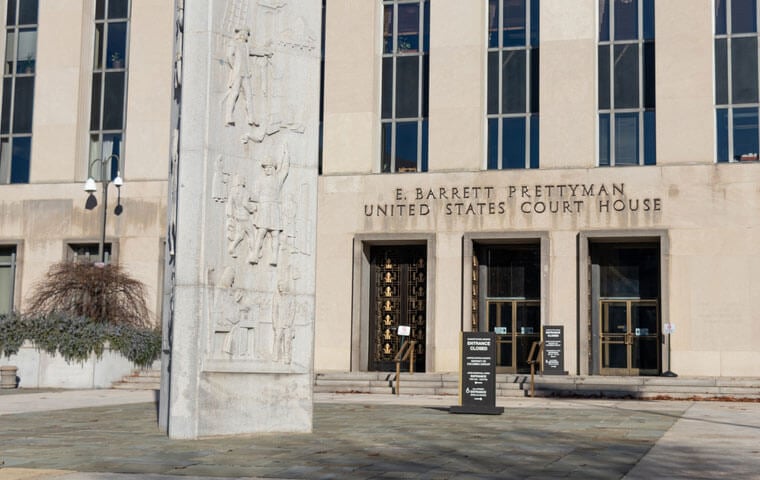 At issue in the appeal was whether a law stating that a Special Counsel may be fired only for “inefficiency, neglect of duty, or malfeasance in office” is an unconstitutional limit on a President’s authority. Image: The Bold Bureau/Shutterstock.com
By: FEDweek Staff
At issue in the appeal was whether a law stating that a Special Counsel may be fired only for “inefficiency, neglect of duty, or malfeasance in office” is an unconstitutional limit on a President’s authority. Image: The Bold Bureau/Shutterstock.com
By: FEDweek StaffUPDATED: Hampton Dellinger has dropped his challenge to his firing as head of the Office of Special Counsel in the wake of a federal appeals court’s preliminary ruling against him, putting at stake challenges the OSC has been pursuing against the widescale firings of probationary employees.
An order from the U.S. Court of Appeals for the District of Columbia Circuit temporarily upheld the firing while the court prepared to hear the merits of the government’s appeal of a lower court’s ruling in his favor that kept him in office. Even though the court meanwhile agreed to expedite the case, a decision there likely would not come for a matter of months, and a likely appeal to the U.S. Supreme Court by the losing side would have consumed months more.
In a statement released to news organizations, Dellinger said that during that time, the OSC would be “run by someone totally beholden to the President” in any case. “I think the circuit judges erred badly because their willingness to sign off on my ouster — even if presented as possibly temporary — immediately erases the independence Congress provided for my position, a vital protection that has been accepted as lawful for nearly fifty year,” he added.
In firing Dellinger, the Trump White House named one of its own political appointees, VA Secretary Doug Collins, as the acting head of the OSC. Whether that will remain the case or whether the White House names someone else, that individual might the drop two key cases Dellinger had been pursuing against the probationary employee firings.
The MSPB granted stays in both for the OSC to investigate whether to bring formal charges that the firings violated federal personnel laws on layoff procedures and the notice of performance deficiencies required when firing probationers. In both—one involving one employee from each of six agencies and the other involving some 5,900 Agriculture Department employees—the MSPB issued 45-day stays in the firings and has ordered the employees reinstated for the meantime. Dellinger also had indicated that he was looking into bringing similar cases against other agencies.
At issue in the Dellinger’s challenge to his own firing was whether a law stating that a Special Counsel may be fired only for “inefficiency, neglect of duty, or malfeasance in office” is an unconstitutional limit on a President’s authority to run the executive branch. The lower judge held that it is not, saying that the brief email from the White House personnel office firing Dellinger provided no such reason. The judge further stressed that the OSC by design is an independent agency.
The appeals court did not directly rule on those issues, holding only that the firing should be in effect while it considers them.
Separately, a second federal judge recently had reached the same conclusions as the one in Dellinger’s case in ordering that Cathy Harris remain in office as a member of the MSPB governing board. The administration could appeal that order as well, and a similar decision by the appellate court could leave the MSPB without a quorum to decide cases—amid a surge of challenges by individual probationary employees to their firings, with class action type appeals also being prepared.
Attorneys specializing in federal employment law had been expecting that regardless of the outcome in the lower courts, Dellinger’s case ultimately would be brought before the U.S. Supreme Court. It already had reached that level when the Justice Department challenged an initial order from the trial judge keeping him in office pending consideration of the merits of his case. At that time, the high court sidestepped the issue on grounds that the lower court would soon issue a ruling.
Deferred Resignation Periods about to End for Many; Overall 12% Drop
Retirement Surge Likely as Deferred Resignation Periods End
Senate Rejects Bills to Defer Shutdown; Familiar Process Lies Just Ahead
Senate Bill Would Override Trump Orders against Unions
Report Describes Impact of Shutdown on Employees, Agencies
TSP Adds Detail to Upcoming Roth Conversion Feature
See also,
How to Handle Taxes Owed on TSP Roth Conversions? Use a Ladder
The Best Ages for Federal Employees to Retire
Best States to Retire for Federal Retirees: 2025

